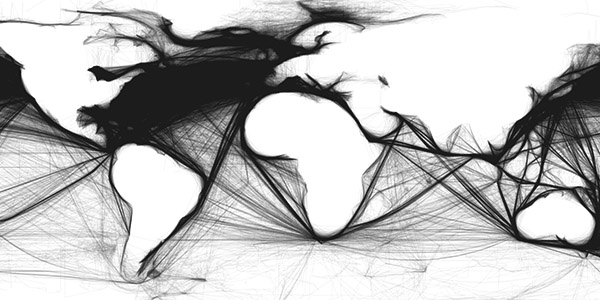Digital History Seminar Series
Three presentations | Spring 2019

Ghost Shipping Paths: computational analysis of the American whaling industry; B. Schmidt, NU Lab
“This seminar series is part of our ongoing exploration of computational methods and digital media for research and teaching in the history field. Writ large, this new series is a space for us to reflect on our engagement with the new MIT Schwarzman College of Computing."
— Jeffrey Ravel, Professor of History, and head of MIT History
Introducing the Digital History Seminar Series, Jeffrey Ravel, Head of MIT History, explained that the series is part of the History faculty's ongoing exploration of computational methods for research and teaching — a growing practice that is referred to as "digital history." Over the past 15 years MIT historians have led several substantial projects in digital history ranging from the Comédie-Française Registers Project, an analysis of French theater in the 18th century, to Visualizing Japan and Visualizing Imperialism and the Philippines, 1898-1913, two MOOCs (Massive Open Online Courses) developed by the department.
The current seminars on innovative digital history projects are especially timely given the recent founding of the MIT Stephen A. Schwarzman College of Computing, which will equip MIT faculty and students in any discipline to use computing and AI tools and also, equally, will enable faculty from all MIT disciplines to inform and guide the development of new technological tools. "Writ large," Ravel said, "this seminar series is a space for us to reflect on our forthcoming engagement with the new college."
Three Presentations

Cameron Blevins launches MIT Digital History Seminar Series
In the first presentation of the new series, Cameron Blevins, an historian of the American West at Northeastern University, discussed the use of computation and digital media in his own research on the US Postal Service as well as applications of digital mapping and spatial analysis tools to study two other historical questions: on the growth of the American whaling industry; and how neighborhoods in Washington, DC became more racially segregated in the mid 20th century.
More

Digital Zombies and Virtual Reality: Juliette Levy on history in the digital classroom
"Weekly podcasts, a virtual reality experience involving Che Guevara, and a learning game with zombies are among the digital platforms a history professor has used to enhance her teaching and make the subject engaging, especially for large classes of hundreds of students."
More

William J. Turkel on computation and the practice of 21st-century history
In a talk at MIT on ways that computation is altering the practice of 21st-century history, William J. Turkel, PhD'04, and a professor of history at the University of Western Ontario, described examples of the phenomenon, including his own experience in publishing two books. The first book took him seven years to complete. The second, ten months. The difference, Turkel said, is directly related to his embrace of new computational methods.
More
Suggested links
Jeff Ravel, Head, MIT History
Digital History Seminar Series
Seminar 1: Cameron Blevins: Computation and digital media in history research
Seminar 2: Juliette Levy: Digital zombies and virtual reality — digital history in the classroom
Seminar 3: William J. Turkel: Computation and the practice of 21st-century history
MIT Digital Humanities Program
Online Courses and Resources from MIT History
Visualizing Imperialism and the Philippines, 1898-1913, an MITx, edX MOOC
Visualizing Japan, an MITx, edX MOOC
Stories
3 Questions: Jeffrey Ravel on bringing data to cultural history
MIT conference stems from data-rich historical project on French theater.
Interview: Ravel on French History
A global French history conference at MIT
MIT reshapes itself to shape the future
Gift of $350 million establishes the MIT Stephen A. Schwarzman College of Computing, an unprecedented, $1 billion commitment to world-changing breakthroughs and their ethical application.
Making a path to ethical, socially-beneficial artificial intelligence
Leaders from government, philanthropy, academia, and industry say collaboration is key to make sure computational and AI tools serve the public good.
Stories Prepared by SHASS Communications
Editorial and Design Director: Emily Hiestand
Writer: Elizabeth Thomson
Published 24 April 2019